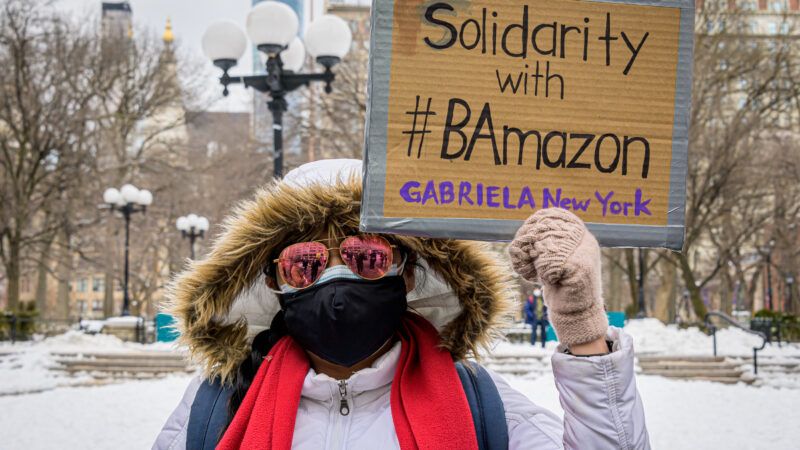Why the Conservative War on Woke Capital Is Doomed To Fail
It will be coopted by regulation-loving progressives who oppose capitalism, not wokeness.

Conservatives feel besieged in the culture war. Large corporations that previously seemed at least somewhat ideologically more sympathetic to Republican views have moved openly left. Amazon, Starbucks, American Express, and countless other big businesses criticized Republican efforts in Georgia to restrict voting rights, and Major League Baseball (MLB) moved the All-Star Game out of the state.
In response, conservatives are considering retaliation: Republicans might strip the MLB of its antitrust exemption and repeal certain tax breaks. The intellectual leaders of the new political right also occasionally discuss loftier schemes: breaking up large companies like Amazon entirely, taking away the broad liability protections enjoyed by Facebook and Twitter, and various legislative remedies.
The problem for the opponents of "woke capital" is that many of these proposals would either fail outright or cause worse problems than the ones they intend to solve. For instance, vesting the federal government with enhanced power to split apart massive tech companies on antitrust and anti-monopoly grounds—an approach favored by Sen. Josh Hawley (R–Mo.)—would do little to tackle the issue of social media sites censoring conservative users. But it would expand the state, empower traditional media, and in general harm the profits of private businesses, which is probably why it's a strategy beloved by progressives in the mold of Sen. Elizabeth Warren (D–Mass.).
Indeed, the Senate held a hearing today to confirm Columbia University law professor Lina Khan to the Federal Trade Commission (FTC). Khan, who was nominated to the post by President Biden, is a Warren progressive who thinks Amazon is anticompetitive in nature and should be split into several different entities. It is the Democratic Party that's truly coming for woke capital—not because of the wokeness, but because of the capitalism part.
Richard Hanania, an expert on partisanship and ideology, has an excellent Substack post, "Why Is Everything Liberal?" exploring the subject of how woke capital came to be. Hanania's post is essentially an extended rumination on Robert Conquest's Second Law of Politics: Any organization that is not explicitly rightwing will eventually become explicitly leftwing. Hanania points out that the U.S. is roughly split between conservatives and liberals as evidenced by our national election outcomes, but liberals dominate in terms of who donates to campaigns, shows up for rallies, and becomes extremely active in politics. He presents some evidence that the least invested and most invested people tend to be liberals; conservatives are moderately invested, and vote for Republicans, but otherwise prioritize things like making money and having families.
"Those who identify on the right are happier, less mentally ill, and more likely to start families," writes Hanania. "But in the end, the world they live in will ultimately reflect the preferences and values of their enemies."
That's because their enemies are highly interested in capturing influential positions in politics, government, the media, universities, and even within corporations. In order to force Coca-Cola to take a progressive stance against Republican positions on voting, climate change, and antiracism, a person who cares about those things doesn't actually have to take over the entire company: Consumer or low-level staffer, they simply have to make a lot of noise. A small number of employees at media companies have managed to leverage human-resources-adjacent concerns about safe workplace environments against their ideological foes, replicating a process that is already well underway on university campuses.
Thus far, the conservative opposition to this phenomenon has largely taken the forms of complaining and then threatening vast government action. Hanania explains why this is impractical: "Do you want to give government more power over corporations?" he asks. "None of the regulators will be on your side." The people who staff the regulatory bureaucracies are Lina Khan types: They're there to battle capitalism, not woke-ism.
There clearly is something that can be done about woke overreach, to the extent that part of the problem is caused by bad government incentives. Republicans would probably benefit from a strategy of freeing businesses from the regulatory burden of appeasing their most easily offended employees. And lawmakers should stop forcing taxpayers to subsidize baseball stadiums—not because the government needs to punish the MLB, but because it is not the role of the government to fund private stadiums.
The conservative war on woke capital will fail because the weapons of the regulatory state are progressive by their very nature. Conservatives should consider strategies that actively shrink the state, if they ever take power again.

Show Comments (262)